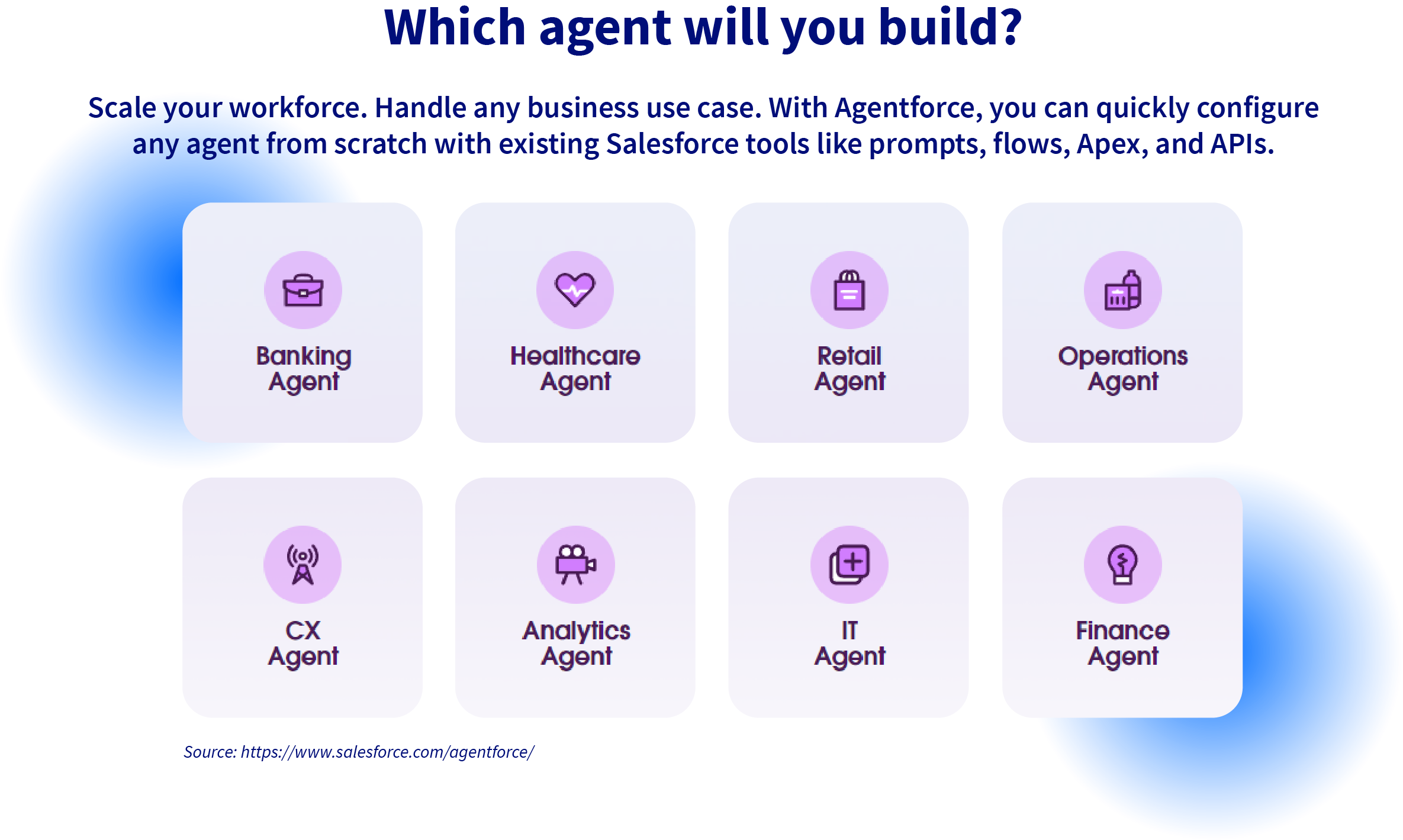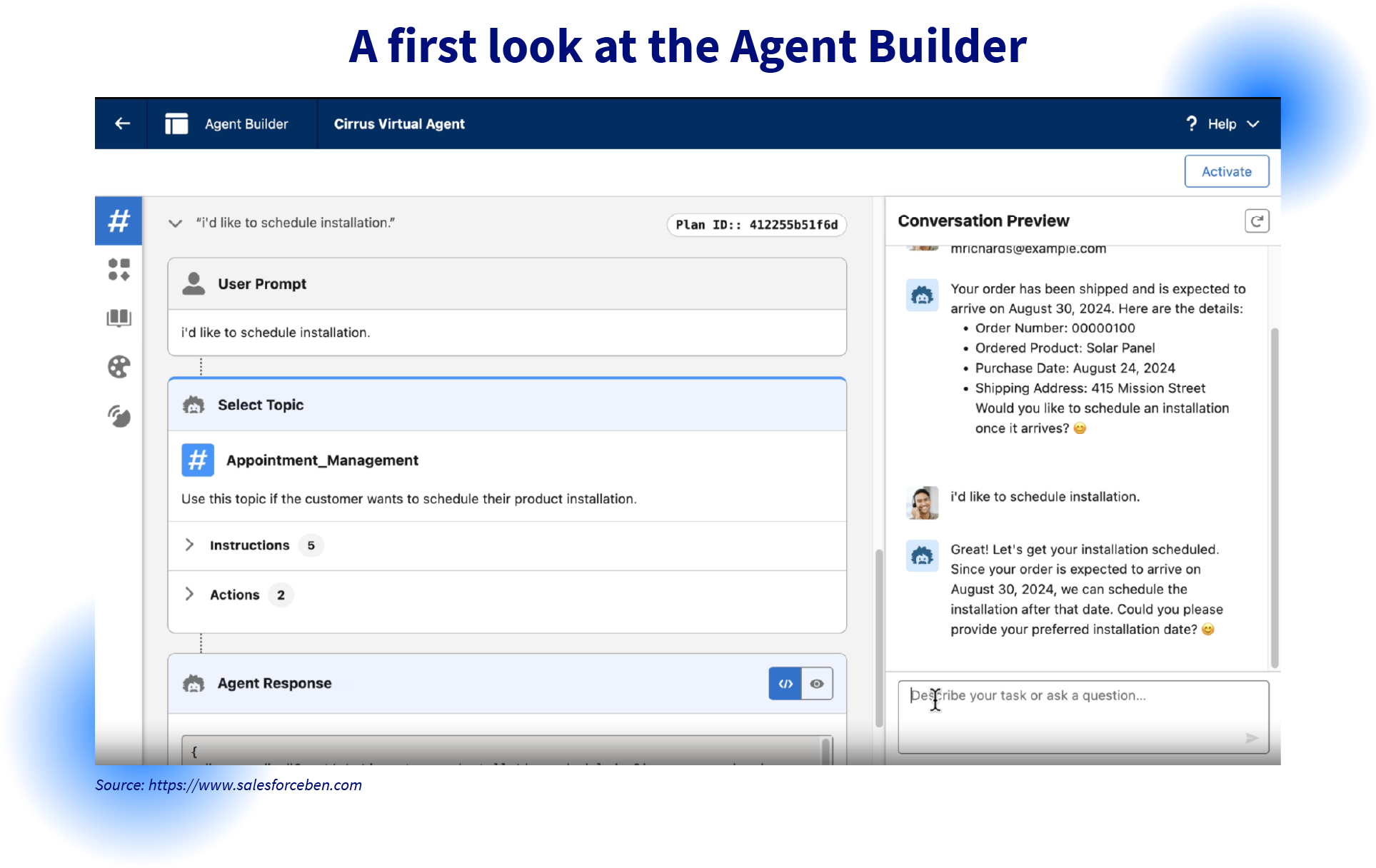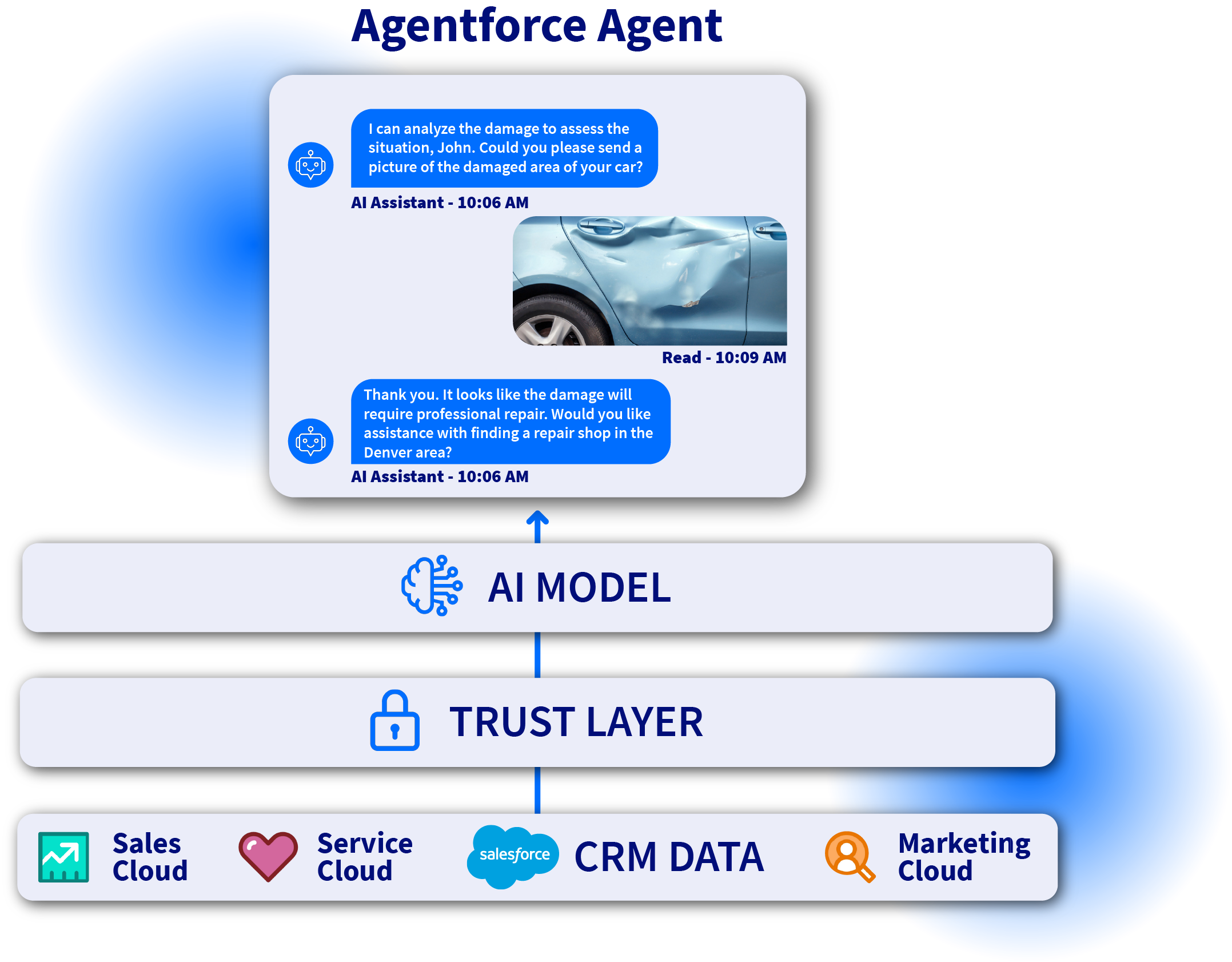Update – November 21, 2024: Salesforce continues to roll out Agentforce at breakneck speed and with highest priority. Bucher + Suter is in the process of creating their first extension for b+s Connects compatible with Agentforce, and we’re diving into a number of use cases for our developers and delivery team to map to. A lot more to come – stay tuned!
Salesforce recently announced the release of Agentforce, a customizable, generative AI agent builder. Despite all its fanfare, the release left many contact center professionals wondering what, exactly, Agentforce actually is.
Given Agentforce’s proposed—and vastly broad—application in the Salesforce ecosystem to bring “Humans and AI Agents Together”, as well as its use of the word “agents”, a term we customer support people like to reserve for the humans sitting in the contact center, to describe AI bots, a bit of confusion is only natural.
We were at Dreamforce for the release, so here’s what we know:
Think of Agentforce as a new and expanded version of Einstein Copilot built on significantly upgraded architecture. Essentially, Agentforce allows you to deploy pre-built, autonomous AI bots (or customize your own) that work with your CRM data to answer questions for a variety of use cases—including the contact center.
As we alluded to and as counterintuitive as it might be for us, “agents” in this context is not synonymous with contact center agents, virtual or otherwise. You can deploy Agentforce’s autonomous AI agents for internal and customer-facing use cases, from providing personalized product recommendations to employees and customers to delivering 24/7 self-service.

But you don’t have to go the customization route if you don’t want to. Salesforce offers five pre-built Agentforce agents:
- Service
- Sales Development Representative (SDR)
- Sales Coach
- Personal Shopper
- Campaign
Across the board, these AI agents embody the main selling proposition of this new platform: bringing together humans, AI, data, and actions. In this post, we’ll share how we see Agentforce integrating with contact center organizations.
Recommended reading: Agentforce press release.
What Agentforce does
If you’re a Salesforce user, you’re likely familiar with Einstein Copilot, whether your company is already using it, or you’ve just been exposed to it via the Salesforce marketing machine. Agentforce agents might sound like something similar. Whereas Einstein Copilot was/is designed for assisting humans inside your organization, you can build Agentforce agents to work autonomously in external-facing roles and in the assistance of internal employees.
Ask any Salesforce employee and they’ll tell you, emphatically, that Agentforce is not a rebrand of Einstein Bot. They’ll tell you that Agentforce offers continuous learning, expanded complexity tolerance, and the kind of continuously learning autonomy that Einstein Bots cannot.
Central to Agentforce is Agent Builder, a user-friendly interface rooted in prompt engineering and natural language processing (NLP). With Agent Builder, almost anyone with minimal technical expertise can design and deploy an agent.
The Agentforce platform leverages large language models (LLMs) to interpret and map natural language inputs into actionable topics and instructions. It also uses large action models (LAMs) that function as deterministic engines.
Together, these components help to make up the Atlas Reasoning Engine, which analyzes all available data within the chat to decide the most appropriate actions to resolve queries. This can include:
- Prompts
- Knowledge base content
- Available data from Salesforce Data Cloud

Of note are the five attributes of any Agentforce agent, as described here. Here are those five attributes in summary:
- Role: Jobs and tasks
- Data: Structured and unstructured data sources
- Actions: Answering questions, automating workflows, etc.
- Guardrails: What the agent shouldn’t do (e.g., generate toxic responses)
- Channel: Medium of operation (Slack, website, etc.)
Use case for Agentforce
Agentforce agents can support various roles such as sales coaches, SDRs, and customer service representatives.
For example:
- Level 1 Support Model: Build an autonomous GenAI agent available for 24/7 self-service and capable of escalating cases to a human agent when necessary.
- SDR Support: Help prospects answer product questions, work through objections, and book meetings with sales representatives. Provide a conversational interface that helps agents (especially new ones) automate time-consuming aspects of a sales rep’s day-to-day work (updating status of open deals, for example, or knowledge lookup).
- Marketing Assistant: A conversational interface that marketers can use to generate campaign briefs, segments for target audiences, and supporting content. Marketers can rely on this agent for proactive recommendations based on real-time performance data.
On paper, Agentforce could make a lot of sense for large companies that want to offer robust contact center experiences without having to deal with outsized expenses (labor, space, etc.).
Across all five pre-built use cases, Agentforce will at the very least automate routine tasks. Not unlike the chatbots you may already use within your organization; but potentially with faster time to value, less development time, and better integration with your existing Salesforce ecosystem.
Overall, it looks like Agentforce agents are far more capable of handling complex, multi-turn tasks than their predecessors. The key difference here being the more active nature of Agentforce: its agents actively bring deeper, context-specific, and data-driven automations to almost any workflow.
What Agentforce means for the contact center
One of Agentforce’s major advantages is its low-code building methodology and its resulting flexibility. Your team can build agents for use in almost any product within the Salesforce suite, Service Cloud included. Again, if the build-it-yourself option is too daunting, Agentforce offers a pre-built Service Agent that doesn’t need to train on pre-programmed scenarios.

Beyond robust customer-facing capabilities, you can build agents for internal use cases, too. For example, a single agent could support onboarding, training, and upskilling, as well as agent assistance.
And it is a robust solution, at least as presented so far, one that may get even more robust with two of Salesforce’s recent acquisitions:
- Tenyx offers an AI voicebot solution that promises to add voice AI to the Salesforce tech stack.
- Zoomin is a data management solution for organizing company knowledge, which is a critical aspect of Agentforce.
For Salesforce contact centers, Agentforce may well represent the next wave of AI chatbots. You can imagine the time and effort you’ll save with pre-built intelligence that already integrates with the systems you use.
Make of the rumored $2 per-conversation, consumption-based pricing what you will: much of the cost-effectiveness of Agentforce will depend on the shape and feel of your own contact center operations. At the moment, consensus opinion holds that this price is an indicator of Agentforce’s target buyer: large enterprises. In our opinion, that buyer is even more specific: large enterprises with mature strategies for data and AI. Without those two components, Agentforce agents will be as susceptible as any to inaccuracies, hallucinations, and lackluster CX.
Is Agentforce right for you, right now?
Theoretically, once some of the important missing pieces go GA in the next couple of months, this is a solution that your team can begin using rather quickly, especially given all the pre-built functionality and the ease of execution supported by the generative AI and natural language approach. But there’s a lot we still don’t know (including, at the time of publication – a confirmation on pricing). So, here’s a few things to keep in mind:
- It’s early: In fairness, it’s only been a couple of weeks since its announcement. But beyond the press release and Agentforce page on the Salesforce website, information remains limited (for example, you’ll find relatively little about Atlas Reasoning Engine if you go digging).
- It still feels a bit roadmap-y: Based on the limited information that’s currently available, Agentforce promises a lot for the future both of customer service and your Salesforce operations. But some key features are still not available, and you’re still more likely to find concrete details on its application on Reddit boards than the actual Salesforce website. While a handful of us were able to build our own Agents, live at Dreamforce, and those who did see huge potential for how, we internally and, our customers will be able to take advantage of Agentforce, as of today (early October 2024) there are still things to be answered and straightened out.
- It’s likely going to be more complicated than clicking a button and going: The marketing does make it seem like a viable out-of-the-box chatbot. But we’re talking about large enterprise contact centers here, most with their own nuanced use cases and workflows. Say you are ready to roll right now, you’ll have some hoops to jump through: the Salesforce website directs interested customers to either sign up for professional services or register for an upcoming agent-building workshop.
Salesforce moves quickly, though, and we’re confident that some of the issues we mentioned above will be ironed out in the coming weeks. This will provide clarity and guidance as to whom this is really made for, beyond the beta testers and early adopters.
All things considered, Agentforce promises to be a powerful tool for contact center automation. It sits cross-platform and offers viable, efficiency-boosting use cases for the contact center. Whether or not that means your contact center is TBD.
At Bucher + Suter, our goal is to give you expert guidance regardless of our relationship with technology partners. The good news is that the Bucher + Suter team has experts in contact center, Salesforce, automation, and AI—all perfectly poised to help our customers make the most of their technology investments, including in Agentforce, with a use case-led approach.
While many of the use cases for Agentforce in the contact center remain on the roadmap, much is available today through the integration of Webex Contact Center into Salesforce, and we’d be delighted to discuss the possibilities with you.





